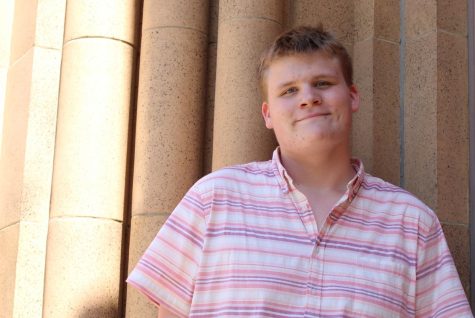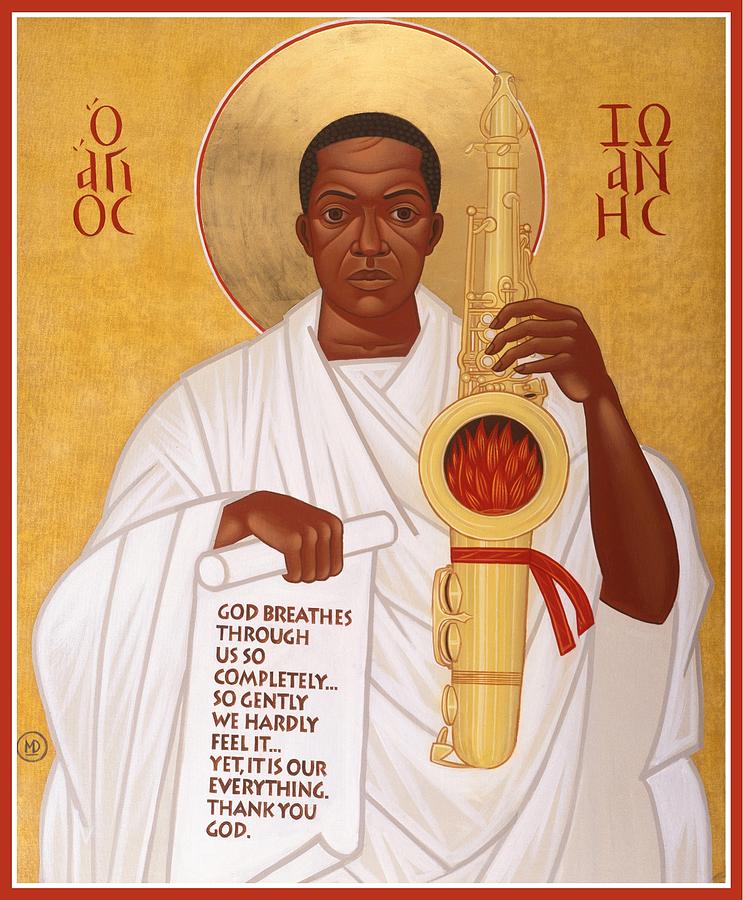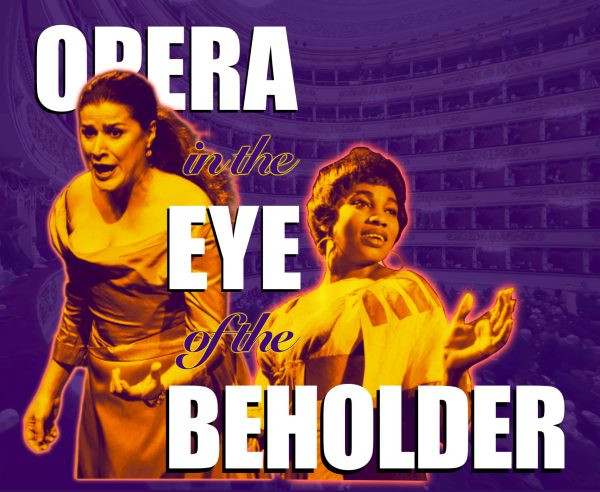Coltrane’s Holy Horn
Interview with Rev. Haqq from the Coltrane Church in San Fransisco.
Art by Mark Dukes. “God Breathes Through the Holy Horn of St. John Coltrane.”
The St. John Coltrane Church in San Francisco was established by Archbishop F. W. King and Supreme Mother Rev. Marina King over 50 years ago, and is named after their canonized saint, saxophone composer John Coltrane. Coltrane’s suite “A Love Supreme” is very important to the church, and a meditation on it occurs monthly. The church has been important to the San Francisco community since its founding and continues holding services over zoom. I interviewed Reverend James Max Haqq, a leader and saxophonist at the Coltrane Church, to learn more about the church, and the influence of Coltrane.
Question: What is the message and goal of the Coltrane Church?
Max Haqq:
The aim of the Coltrane Church is to cover the Earth with the Coltrane consciousness. Coltrane consciousness can hardly be defined, but you might call it a sanctified awareness of God, as “Love Supreme”, manifesting an anointed sound from the throne of heaven out of the very mind of God incarnate in John Coltrane. He said he wanted to be a force for real good in the world. We just recognize that he attained his goals to make people happy through music and lessons through “Love Supreme”, and not just a fleeting happiness, a momentary thing, but a deep-rooted happiness in the soul. Archbishop King, the founder of the St. John Coltrane Church has said, “to be happiest is to be saved, to be saved is to be happy.” We’re on a mission from God to save people and bring happiness, joy, peace, love and protection throughout all creation.
Question: What is the significance of “A Love Supreme”?
Max Haqq:
All of John Coltrane’s creative output is kind of unified and connected, and at the same time, “A Love Supreme” stands in the center of all that by his own placing. It was on that album that, when he conceived it in his home, Alice Coltrane relates the story that he was upstairs in their home, in Long Island for a or few days, and she hadn’t seen him. When he came down, his face was glowing like Moses, and he said, for the first time, he had everything, and he wanted to report the whole thing in suite. He had this experience, really a vision of God, that led him to compose “A Love Supreme.”The wonder of the recording itself is there for anybody that listens to hear, and he put his testimony on it. He designed every aspect of the album, from the drawing on the inside, and he wrote the songs. It’s a really personal statement from him and it touches the core, his Being. We recognize it, as he put it in the center.
Question: What was Coltrane’s general influence on jazz music or music in general?
Max Haqq:
I mean, it can hardly be estimated. It’s just growing. I’d say that would be an interesting question to revisit if we’re around to look at it in 100 years, 200 years from now. As you know [Coltrane’s] influence only grows and continues to do so, so it can’t be overestimated. All kinds of [musicians, artists and sculptors] testified to his influence. So yeah, it’s just huge. You can write books about that.
Question: What is the significance of African American music to the United States, culturally or spiritually?
Max Haqq:
I think [Black Music] continues to be the high watermark, and one that artists are continuing to go back to and explore. His influence has not decreased with passing generations. With each generation, you find artists of all kinds of genres…being influenced by his music, and again, his influence on Black music is huge. And you hear [artists] name dropping John Coltrane on hip hop albums or songs.
Question: What has been the contribution of African American music and culture to the church?
Max Haqq:
Coltrane’s music is rooted in the blues, so it’s gospel music. All of that goes back to the original African generations and how their music was transformed by the experience of being enslaved.
We play Coltrane’s music in our worship service, which has become essential to the culture and church experience, and what we’ve been recognized as [contributors] to jazz and to church music for the Coltrance liturgy. In addition to playing Coltrane’s music in church, the sound of our church is also very heavily influenced by the sound of the Pentecostal Church. Because our founding Archbishop grew up in the Church of God and Christ, which is a Pentacostal denomination, and his mother was the Supreme Mother and was born in 1923, she was a very devoted evangelist in the Church of God and Christ. Even though she kind of came up against sexism in the church and had to play roles that were reserved for women, she still really pushed those boundaries. Though she couldn’t be recognized as a preacher, it is said that anybody who heard her knew they were being preached to. So [in the church, we are] carrying the spirit, and doing long versions of songs with a lot of repetition and maybe somebody might speak in tongues, and then we also do gospel music, and also I gotta say reggae.
Just about every form of Black music is what we do. Certainly Coltrane himself incorporated a lot of what had come before, as far as the blues and not to mention Charlie Parker.
Question: What has been Coltrane’s and the Coltranes Church’s contribution to the fight against injustice and racism in America?
Max Haqq:
Well, we’ve been very much in that struggle from the beginning, and the founding of the church touches one of the core aspects of our ministry: the vision of social justice and the struggle to bring that about. Our founding Archbishop was a comrade with Huey Newton, we had many contacts with the Black Panthers in those days. More recently, we’ve been really involved in social justice movements in the Bay Area, and are allied with Nation of Islam. And so, the Coltrane Church and our human outreach programs, when we were able to and when we had a space for the kitchen, were feeding and loving people out of that space for 30 years.
Question: What makes up the members of the Coltrane Church and who is a part of it?
Max Haqq:
Archbishop and Supreme Mother Marina King, they’re the co-founders. If you haven’t seen the NPR documentary that was done last year, you should go on YouTube and check that out. They’ve got some nice interviews with them, and you can kind of get their vibe. Their oldest daughter has been the pastor for 12 years. It’s very strongly family centered. And at the same time, [the church] has a really sprawling global reach. We have members in every continent.
I would say that the core group of people who are really the engine of the [church] is a family, and it’s a small number, but you know, we’ve been on Zoom, we have probably 20 or 30 people on Zoom every week and another couple of 100 that watch it on Facebook.
Question: How did John Coltrane gain his position as a saint?
Max Haqq:
The line on that is always when we demoted him from God. That’s pretty close to the truth because St. John Coltrane was from the early days of the church, regarded as this avatar, essentially an incarnation of God. Then in 1982, the Archbishop of the African Orthodox Church came from Chicago to San Francisco and was introduced to Joseph King and our community back then, which was known as the One Light Temple. Archbishop Hinkson from the African Orthodox Church came to scope us out and see if it was going to work to have us come under their auspices. Of course, our people are divisive and everyone was scoping him out too. [But] … it all worked out beautifully because there’s a lot of mutual love and respect. That’s when we became part of the African Orthodox Church and the Bishop… who was already recognized as such [in the Coltrane Church], became, on paper in the eyes of the world, a bishop. At that time, it was kind of part of the deal for our community [that] we’re not coming into the African Orthodox Church without John Coltrane. So what can you do for John Coltrane? Archbishop Hinkson was like, “well he can’t be God but we can make him a saint.” So Archbishop Hinkson was the one who sanctified John Coltrane and made him a saint. John Coltrane, when he was touring Japan [in 1966,], was asked “What would you like to be 10 years from now?” And he said, “I’d like to be a saint.” We, of course, don’t believe he meant that he wanted to be canonized by the church. He wanted to be a saint like almost that Hindu kind of sense [where] the saint is one who’s enlightened. And then in the Black church the saints are the members of the church, [like the Black spiritual] “when the saints go marching in.” So our vision of John Coltrane sainthood is not defined by the Catholic Church’s conventional ideas about sainthood.
Question: What was the message that Coltrane lived by?
Max Haqq:
Well, he said “live clean, do right. You can improve as a player by improving as a person.” He said he wanted to be a force for real good. As long as there were forces that brought misery and suffering to the world, he said he wanted to be the opposite force.
He [talked] about how God’s way is through love no matter what, it is God.
John Coltrane is one of those people that’s rare.
I think people are trying to dig up dirt on him, but there is just nothing there. Everyone knows he was addicted to heroin and alcohol. He went through that type of thing, but you don’t hear reports of him just being a jerk, doing bad stuff and just treating people wrong. There are not many bad reports about John Coltrane.
Question: What’s the current status of the Church?
Max Haqq:
Right now we’re on Zoom. We meet once a week for Sunday service at noon Pacific. We have this first Sunday meditation service on the first Sunday of every month.
For More Information on Coltrane and the Coltrane Church
Listed below are places to check out if you want to listen to “A Love Supreme”, or learn more about Coltrane and the Coltrane Church.
A Love Supreme:
The Church Website:
https://www.coltranechurch.org/
NPR Documentary:

2021-2022 - Staff Writer
2022-2023 - Managing Editor
Pronouns: he/him







![Polynesian Club Performs at the Cultural Celebration Assembly
[Photo Courtesy of Savannah Earley]](https://cmagazine.org/wp-content/uploads/2025/04/PNG-image-600x535.jpeg)